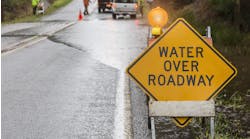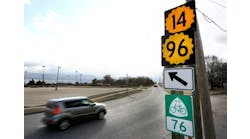The Greek philosopher, Aristotle, was never a part of a hot-mix asphalt (HMA) paving crew and never worked at a hot-mix plant, but his teachings are applicable to the field, at least in the case of Shalimar, Fla.-based Couch Construction LP. The philosopher’s thoughts on excellence in association with other ideas on courage, humility and nobility served as guiding principles by which the employees of the company have lived in recent years.
Adherence to these ideas has paid off for Couch.
In January, the company was rewarded for its work on a 60,000-ton milling and overlay project on I-10 in Madison County, Fla., by being picked by the National Asphalt
Pavement Association (NAPA) to receive its 1999 Sheldon G. Hayes Award for Highest Quality in Asphalt Paving. The award, given for projects over 50,000 tons, is the highest honor bestowed in the asphalt paving industry.
The company’s philosophical approach to asphalt paving came from the top. "My son was a philosophy major in college," Couch President, Cloyce Darnell, told ROADS & BRIDGES. "Eventually, I began reading philosophy." Borrowing from philosophers such as Aristotle, Couch forged four basic ideas by which the company and its employees have been guided: possibilities, habits, courage and balance. Darnell likes to add one other guiding idea that he calls "worms."
Possibilities — Possibilities is a principle spawned when Darnell learned about school kids in a poor area of Texas who were teaching their parents to read. According to Darnell, despite the odds, kids from the area were routinely attending Ivy League schools on academic scholarships. Their philosophy was, "When better is possible, good is not enough."
Darnell pointed out that Couch had already been a two-time winner of Florida’s top paving award in 1979 and 1987, and that the company had been a pioneer in the use of reclaimed asphalt pavements. "But we felt we could do better," he said. "The state was paying for products and they weren’t getting what they wanted. We thought we could do it better."
Habits — Aristotle said, "We are what we repeatedly do. Excellence then is not act, but a habit." "You can have a good day, but to win the Hayes Award you must be very good for a long time," said Darnell. "That’s what we really tried to do. We just made it a habit. Yes, we are going to make mistakes, but our goal is to excel everyday, all day long."
Courage — Courage is not just about finishing, but it’s also about believing in yourself enough to begin. "There are a lot of people that look at Superpave and say, ‘I can’t do that.’ But our people couldn’t wait to get started," Darnell said, "because they know they are going to have the opportunity to do something really good. They refuse to fail, and they believe they can do anything.
"These people have to muster the courage every day to go out on there and stand on an interstate, traffic buzzing by them at 60 miles an hour, 3 feet from them if they are lucky, stand on their feet all day long, work the hours they work, under the conditions they work. There comes a point that it is not just about getting a paycheck. That’s a part of our business that too many people are not aware of, or don’t think about. It takes a lot of courage for our people not only to get up and get the job done, but then to do it so well. It’s remarkable."
Balance — Balance refers to the balance of humility and nobility. "Humility is living with the knowledge that there is more to learn or a better job to do," said Darnell. "I think that we all have to know, believe and live that we can be better in everything we do. Also, we have to believe in ourselves. ‘The world was made for me. Make room for me. I can build this job or I can learn how to do this design or I can learn how to take care of this equipment.’ When I talk in terms of humility and nobility, I talk in terms of ‘There is more to learn, but I can do it.’"
Worms — Winston Churchill said, "We are all just merely worms, but some of us are glow worms." "Our people are definitely glow worms," said Darnell. "We were honored and privileged to accept the award on their behalf because they were the ones who earned it, daily."
Darnell summed up the company’s feeling about its way of doing business by saying, "We don’t give a test on how we see the world or whether anyone adopts or believes in our philosophies, but it works for us."
Put it in writingExcellence was not only a goal set for the project, it was written into the partnering agreement developed by the contractor and the Florida DOT (FDOT). The agreement specifically stated winning the Hayes Award as one of its main goals. "We had not done a lot of projects large enough to be eligible for the Hayes Award," said Darnell. "This was the first project in years where we had this opportunity."
Another partnering goal was to achieve pavement density. Density was cited as a key factor in the failure of previous Superpave pavements in the Sunshine State. The state’s lack of success led to the revision of its Superpave specifications.
The I-10 project was of critical importance in Florida in that it was the first successful Superpave project to be conducted under FDOT’s revised Superpave specifications for course-graded mixes in high traffic zones. "In the mid-’90s they were having a lot of problems with getting density in the state," Darnell said. "We knew density had been a problem. These new specs required a challenging 94% of theoretical density."
Previous experience prepared the contractor for the challenge of performing its first project using the Superpave mix design process.
Coarse-graded mixes are required in Florida when Superpave projects are performed on roads with higher ESALs. Couch had experience with tough military specs for runways and course-graded mixes. "The military has a higher degree of compaction requirements than the Florida DOT’s normal specs," said Darnell. The specs are similar to that of Superpave.
Leveraging its experience with the military runways, Couch obtained a Sakai R2H articulated three-wheel steel roller from California to help in gaining density. "By putting water in the roller drums you can vary the pounds per linear inch of compactive effort," said Darnell.
Attention then focused on the mix design. "We wanted to design a mix that we could produce and compact," said Darnell. "We knew people were having trouble producing what they had designed." Equipped with its own testing lab, Couch was prepared for the challenge. "We do our own design work," said Darnell. "We have a lot of experienced, qualified materials people."
The contractor chose to use only crushed granite shipped by rail from Georgia. "In the Superpave structure courses, we used 20% RAP on the project," said Darnell. "But the balance was all granite from Martin Marietta Materials in Georgia. Local aggregate was available and cheaper, but it was absorptive and broke down in the dryers, which means it takes more asphalt."
"Getting consistent, quality material is absolutely crucial in producing Superpave pavements."
To be sure they could produce what they designed, materials were run through the company’s plant in Shalimar. Cores from the project also were taken for design purposes.
Located hours away from the company’s headquarters in the Florida panhandle, Couch purchased an Astec Double-Barrel drum mixer and placed it in northern Florida’s Madison County, about 30 miles east of Tallahassee. On the job, the plant produced on average between 300 and 360 tons of hot mix per hour.
Saying he did not want to sound like an advertisement, Darnell nevertheless praised the plant’s performance. "The quality controls in the plant were so accurate that we were able to make very minute adjustments to the design as we went along," he said.
A test strip, a requirement in Florida, was laid prior to the start of the job by the anxious contractor. "It’s a big day in our lives," said Darnell. "We ran about 1,000 tons. The voids were a little bit low, but the density was good. We made some minor variations to the asphalt and aggregate blend and had no further trouble."
According to NAPA, the low air void problem was corrected by slight adjustments (0.5%) in the quantity of the minus 200 material and in the asphalt content (0.3%).
"Now we had to get it down and get it compacted," Darnell said.
Construction commencesTandem 12-ton Hypac C778B dual vibratory drum compactors were used for initial compaction at 280ûF to 320ûF. On occasion, Ingersoll-Rand DD110 dual-drum vibratory rollers were used. The front rollers made four passes, each at 2 mph. "The compactors are used in tandem because you want to get on it before the pavement gets too cool," Darnell said.
Because Superpave mixes characteristically have a thick film coating, course-graded mixes in particular, Darnell said they are especially sensitive to temperature and cool quickly. "But," he added, "they also have a tender zone."
The tender zone, which occurs between 200ûF and 250ûF, is created in part by using more water than usual on the rollers to keep the Superpave mixes from sticking. The moisture from the vibratory rollers in turn cools the pavement.
To avoid problems in the tender zone, the mat was allowed to cool to 160ûF. "Then we put the Sakai roller on it," he said, to obtain the last 1 to 1 1/2% density. The heavily loaded (335 pli) articulated three-wheel roller made five to six passes at 5-8 mph.
Because of its success in gaining compaction on the pavement, Couch earned $150,000 in compaction bonuses on the job.
The project began by milling off 130 mm (approximately 5 in.) of existing asphalt, placing an asphalt rubber membrane interlayer, and then placing 80 mm (approximately 3 in.) of SP19 Superpave mix. This was followed by the placement of 40 mm (approximately 1 1/2 in.) of SP 9.5 Superpave mix.
The Superpave mix was then topped with a 19-mm (approximately 3/4-in.) open-graded friction course (FC-5) final surface on the mainline. According to Darnell, the friction course did not follow the Superpave mix design process. The FC-5 included 100% virgin material along with 1% hydrated lime to reduce stripping, mineral fibers and 12% ground tire rubber by weight of liquid asphalt.
Outside shoulders received 45 mm (approximately 1 3/4 in.) of SP 12.5 Superpave mix.
A Roadtec RP-180 asphalt paver was used to place the mat, in addition to a Roadtec Stealth paver that was demonstrated on part of the friction course. To obtain the smoothest possible pavement, Couch employed the use of a Roadtec SB-2500 shuttle buggy material transfer device.
The fibers and rubber in the thin surface course made for a stiff mix. "The trick is the shuttle buggy," said Darnell, "because it remixes. Without the shuttle buggy you’ll see more surface blemishes. We had none."
People make the projectCouch faced the prospect of relocating 10 to 12 of its key employees hours away from the home office to perform the project. According to Darnell, the employees were told that once they trained their replacements they could go home. The training was accomplished in four to six weeks.
"We were able to hire one or two people with a little bit of experience, but for the most part, we had to train the people that did this work," said Darnell. "When we got half way or less through the project, we had an entire crew that previously had very little experience if any."
The eight or 10 people hired for the paving crew were not difficult to find because the area was experiencing high unemployment. "It wasn’t hard to find people," said Darnell. "What you had to do was to convince them that this was an opportunity to learn something new. And they came and they worked." Many of the people that were hired for the job in 1997 are still there, according to Darnell.
Couch employees critical to the project’s success were singled out by Darnell: Darren Phillips, manager of plants and materials; Buck Roberts, project manager; Barney Kimmons, paving supervisor; Richard Fletcher, plant superintendent; Joe Davis, equipment manager; and Kelly Phillips, the quality control technician at the plant. Darnell also gave kudos to John Collins, FDOT resident engineer; Dan Turner, FDOT district materials engineer; Gene Pettyjohn, FDOT district bituminous engineer; Billy Steedly, FDOT project manager for Lake City; and John Gerren, the resident engineer on the project for AIM Engineering, the consulting engineering and inspection firm hired by FDOT to oversee the project.
"This was our first project in the county," Darnell said of the $4 million job. The project has spurred further work for the company in the area. To date, Couch has contracted $45 million worth of projects from this Madison County plant profit center.
"We don’t know all the answers about Superpave mixes," said Darnell. "And the more you do with Superpave, the more questions you may have. We were fortunate here in that we had a source of aggregates and the quality and the ability to get this done that all the results seemed almost too good to believe. It’s not that way with every aggregate source and with every plant. It’s a difficult thing to do and there are still problems across the country. Some people are saying this Superpave mix is not what it’s cracked up to be. I know this: In Florida, we’re not having any more rutting problems with these Superpaves.
"The project was a proving ground; we proved you could do it." Couch proved it so well, in fact, that FDOT has used Couch’s practices on the job as an example for future projects in the state’s Superpave seminars.
As for Aristotle? "The philosophy works," said Darnell, who, following the recent purchase of Couch by APAC, is starting his own public/private industry consulting business, "We feel the two jobs we completed just after this project are even better."


